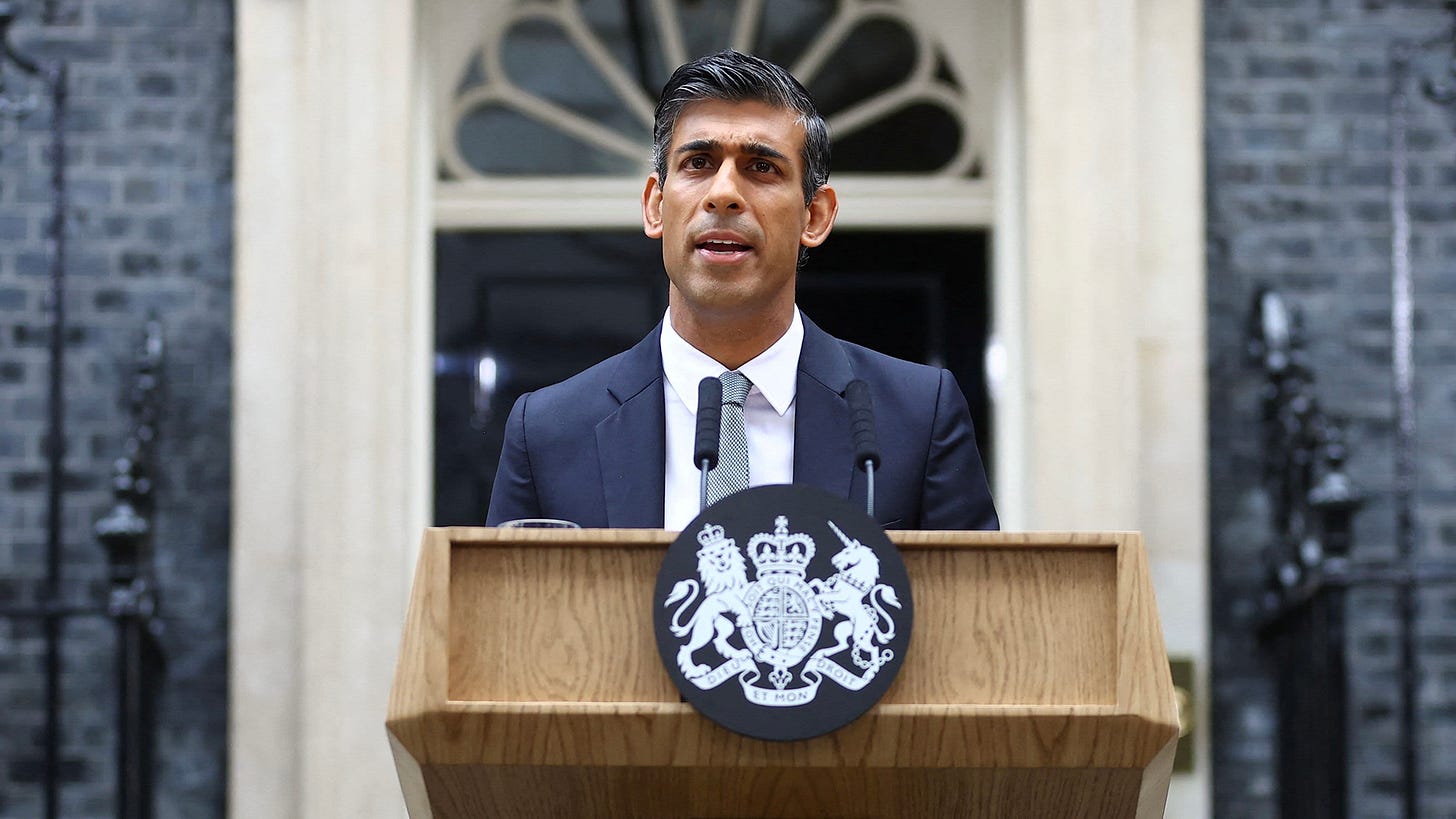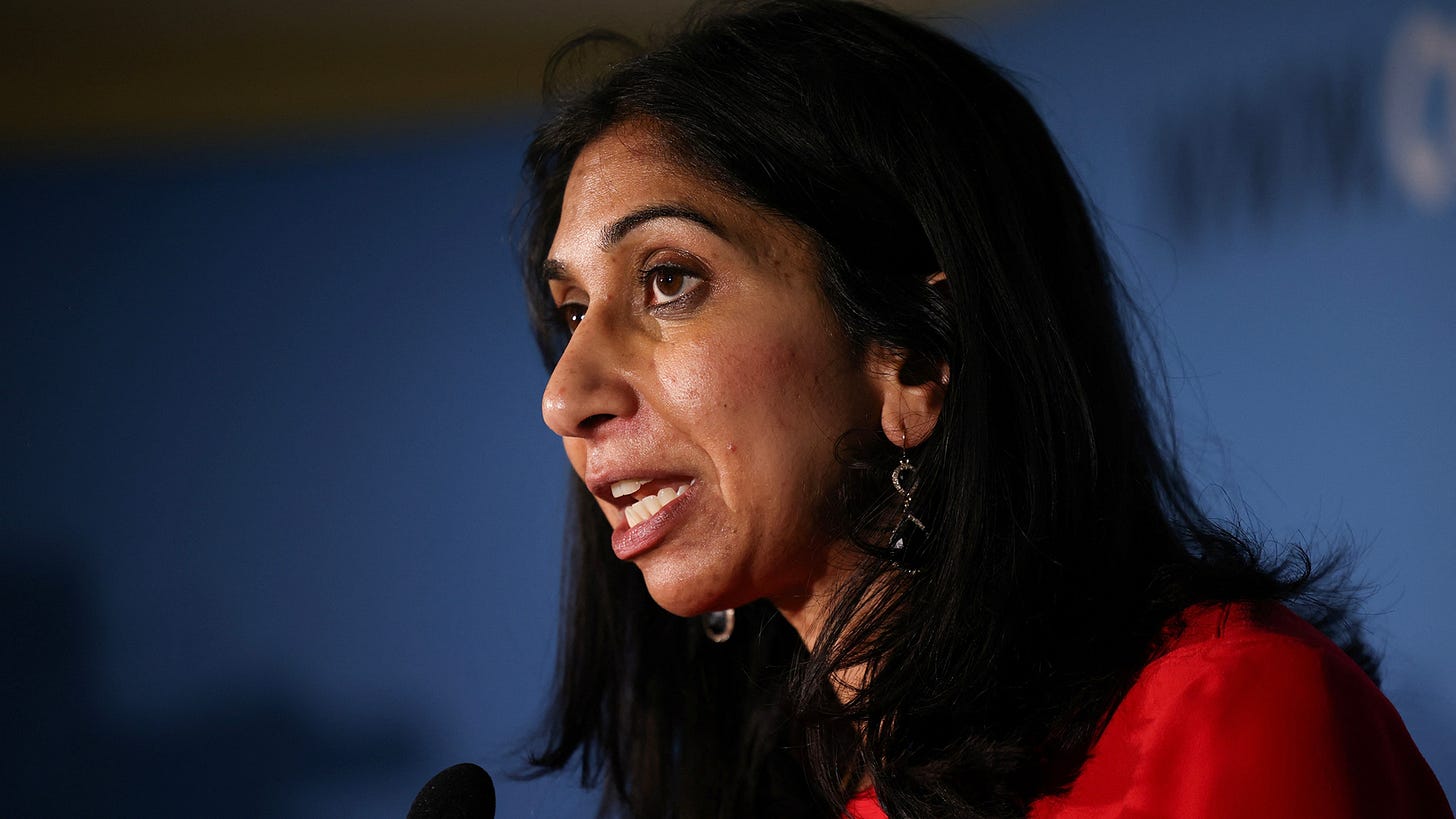Gary Lineker & MOTD Aren't So Important
The Illegal Migration Bill is an illegal migration bill.
For normal people shame serves as a deterrent. Something whispers: “Wait! That’s hypocritical, people will see you’re full of shit,” and embarrassment arrests the inclination. Others seemingly don’t have that whisper or choose to ignore the signals their brain sends. I’m begrudgingly jealous of those who can be so brazen, but I’m too self-conscious to follow their example.
The United Kingdom’s government is objectively shameless. At the top are unelected Prime Minister Rishi Sunak and Home Secretary Suella Braverman. It would be better if their shamelessness was genuine and they were honestly ignorant of how they arrived at their stations, but politicians at their level aren’t naïve. Clear on each point of contradiction, they persevere through inconsistency, pushing boundaries to amass power.
Sunak announced in January his government would create legislation to “tackle illegal migration.” Braverman followed last week with the Illegal Migration Bill, where the Home Office proposes to detain refugees who reach the United Kingdom’s shores and return them to their native countries or send them to supposed “safe countries.”
According to Home Office data, the top five countries whose people landed on British beaches last year were Albania (14,200), Afghanistan (10,000), Iran (7,600), Iraq (4,100) and Syria (3,700). Apparently they only come in boats of precisely 100.
The Albanian case for refugee status isn’t exact, but the other four countries are simple. The Taliban’s return in Afghanistan. The recent uprisings in Iran surrounding human rights. The lasting legacy of George W. Bush and Tony Blair’s two-decade war in Iraq. The exodus of people leaving Syria due to civil war. Understanding why they aren’t “illegal immigrants” but “refugees seeking asylum” isn’t challenging unless you make it challenging.
Five years after Cristóbal Colón set sail on behalf of Spain in 1492, Henry VII of England commissioned Giovanni Caboto (remembered by his English variant John Cabot) to explore on behalf of the Crown. Since 1497, boats from the island have sailed around the globe searching for anything materially beneficial. Great Britain’s desire to expand affected every continent, and each encountered population has been fed British exceptionalism. I’m shocked penguins haven’t yet swum from Antarctica to confirm the rumours.
Perhaps refugees would consider elsewhere had the British stayed on their island and forgone constructing history’s largest empire, but the sun never set in that sense. An extractive nation exporting its culture around the world for centuries while taking resources back home cannot feign surprise at the world arriving at its shores.
The lure of Empire was enough to attract Sunak and Braverman’s grandparents to colonial East Africa from British India, and then their parents to the metropole. Irony fails to capture the malevolence of slamming doors that aided your family in the faces of those coming behind. Shamelessness encapsulates the behaviour, but as Malcolm X explained in “Message to the Grass Roots” (1963):
The house Negro, if the master said: "We got a good house here," the house Negro’d say: "Yeah, we got a good house here." Whenever the master said "we," he said "we." That's how you can tell a house Negro.
If the master's house caught on fire, the house Negro would fight harder to put the blaze out than the master would. If the master got sick, the house Negro would say: "What's the matter, boss, we sick?" We sick! He identified himself with his master more than his master identified with himself.
Politicians who maintain the systems which made their families migrate exasperate me. I understand those who ascend are the exact kind who would sacrifice personal histories on the altar of nationalism, but understanding doesn’t make it any less annoying. I suspect it is a psychological response to being an outsider. One adopts the worst ideologies of an oppressive society and becomes a more ruthless version of previous models to prove themselves worthy of acceptance.
In response to the Home Office, footballer turned broadcaster Gary Lineker offered a dissenting opinion on Twitter:



His tweets caused problems.
Lineker presents Match of the Day, the most popular football highlights programme in the United Kingdom. Were it not shown on state-owned television maybe the former England international would’ve been fine, but the show airs—and has for 60 years—on the British Broadcasting Corporation (BBC).
The BBC has impartiality and social media guidelines, but Lineker is a freelance broadcaster so his relationship with the corporation isn’t as straightforward. Nonetheless, the BBC effectively suspended him over his tweets. Standing in solidarity with their co-host, Ian Wright, Alan Shearer, Alex Scott, and countless others declined to commentate, present, or offer punditry on Match of the Day and various other BBC programming. After one scaled-down show Lineker was reinstated.
Much can be explained by Godwin's Law of Nazi Analogies, which supposes: “As an online discussion grows longer, the probability of a comparison involving Nazis or Hitler approaches one (1).” The rhetorical sledgehammer of Nazi Germany is inescapable. It is the quickest, most intelligible comparison one has to convey evil.
Spending a lifetime perfecting his ability to discuss football, asking Lineker for flawless juxtapositions between language used in Nazi Germany and present-day Britain is perhaps a bridge too far. Though well-meaning, the analogy’s mistake was it created a barrier supporters of the legislation could hide behind to deflect substantive critiques, claiming they weren’t Nazis and Lineker’s comparison was flippant.
There is time to discuss the hypocritical nature of the BBC censuring presenters but not airing the 2022 World Cup opening ceremony over human rights in Qatar. There is time to discuss 14 of 26 players in England’s national team at the same World Cup having heritage outside the United Kingdom, and how the Premier League—maybe England’s most popular export—is filled with players from around the globe. There is time to discuss how countries like Rwanda (i.e. improving and developing nations) shouldn’t be tasked with housing refugees the United Kingdom is better positioned to assimilate.
Before those discussions, however, should come the tens of thousands crossing the English Channel every year on boats hardly capable, risking their lives to escape death and make a new reality for their families.
Turning away from the draconian policy being hustled by Britain’s government to focus on Lineker, Nazis, and broken promises of free speech betrays the seriousness of what the Illegal Migration Bill contains. The first sentence worth reading in the 66-page piece of legislation makes it clear. Under the heading “European Convention on Human Rights” is written:
Secretary Suella Braverman has made the following statement under section 19(1)(b) of the Human Rights Act 1998:
I am unable to make a statement that, in my view, the provisions of the Illegal Migration Bill are compatible with the Convention rights, but the Government nevertheless wishes the House to proceed with the Bill.
The United Nations High Commissioner for Refugees says it “would be a clear breach of the Refugee Convention and would undermine a longstanding, humanitarian tradition of which the British people are rightly proud.” The contempt the UK government have for refugees is not being hidden, they are flaunting international conventions. Brown faces are in charge—which is far more interesting than football—but Lineker, 1930s Germany, and a highlights show have consumed all the oxygen.
Those familiar with American sports will remember Donald Trump calling National Football League players “sons of bitches” during Colin Kaepernick’s protest. The comments landed so hard the billionaire white men who owned the teams fell from their hospitality boxes to show solidarity with their players—even Dallas Cowboys owner Jerry Jones found himself kneeling. Was this in agreement with Kaepernick on police brutality in the United States? Absolutely not. It was about principle: Rejecting being dictated to by the President, not the larger societal concerns brought forth by Kaepernick’s stance. The narrative shifted from racial injustice to something easily sensationalised.
Backing Lineker and a fractured social contract has been similarly centred rather than the inhumane policies Sunak, Braverman, and the Conservative Party are attempting to codify. The BBC’s overreach sparked more solidarity than the statements and context which precipitated their overreach. Personality is more compelling than policy, even if the policy is heartless and the personality understands that.
It’s a shitty place to end, but it’s a shitty situation.
More power to those fighting the bill, and more life to those fleeing abject conditions caused by Great Britain’s imperial project or ones like it. 🎯









It's forgetting where you come from, a slap in the face of all those who suffered under and continue to suffer due tl the legacy of Empire. As you alluded to, being ignorant to these issues in the furtherance of one's own personal/professional success is common among politicians. When they use minorities in positions of power and influence as a way of saying it's a win for representation, that's sickening. They're in those positions so we're all free? Live vicariously through them, whilst the material conditions of people don't improve? That isn't progress, really.